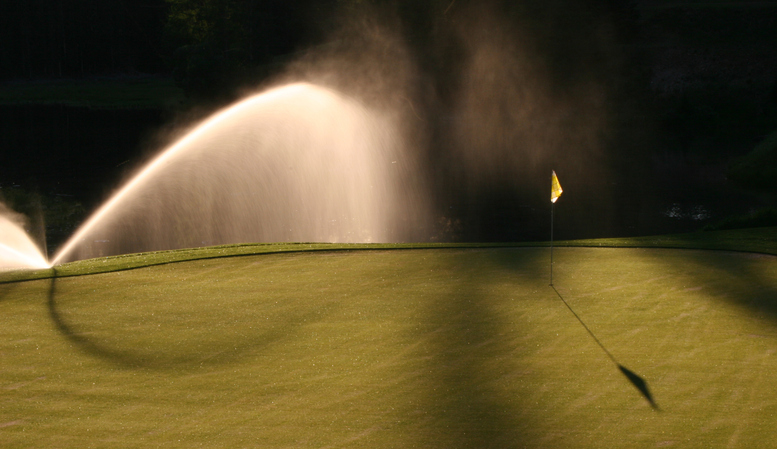In their latest joint GCMA Hot Topics webinar, STRI Group’s Paul Woodham and Rain Bird’s Shaun Anderson are joined by Malcolm Pennycott of Golf Finance to discuss the importance of planning irrigation renovations well in advance, and how clubs can structure affordable investments for the long-term benefit of the business.
In an insightful discussion, which looked at importance of taking a holistic approach to irrigation investment, three GCMA partners unpacked some of the nuances and misunderstandings around redeveloping and securing your water supply.
Whilst new irrigation projects may appear unaffordable, once the headline figure is broken down into a finance package, the numbers involved may appear more manageable, even before other financial benefits of healthier turf – less seed, fewer man hours spent hand watering etc – are considered.
Looking back at the most recent extreme weather conditions, STRI Group’s Paul Woodham said: “It all comes down to water management – dealing with too much of it, then not enough. Despite the prevailing wet conditions we’ve seen through November into December, we’re still looking at drought damaged turf.”
Rain Bird’s Shaun Anderson highlighted that clubs don’t always need to replace a system in one go: “As long as you’ve got good nuts and bolts to your system, you can add to it every year, and it doesn’t have to be that big capital cost every year.”
Shaun also reminded clubs that the HAPNA system is just five simple steps that will probably boost system efficiency by 20-30%.
Shaun also reported that EIGCA recently produced a statistic that said an inefficient irrigation system can be wasting, on average, between 30% and 50% of the water it’s distributing. As he points out, that results in 5 million litres of excess water a year that could be going onto a typical golf course. Aside from not being healthy for the turf, consider the associated electricity costs, and how that wastage runs counter to the need for club’s to be working towards safeguarding their water supplies.
One positive note from Paul Woodham, that there has been a move away from the use of potable water by clubs, was tempered by the observation that one of the replacement sources – boreholes – have been seen to be drying up, saying: “Even as we move into December, many areas are still deprived of water, and there is a very real risk of water companies imposing their highest level of restrictions in 2023, which is the complete ban of using mains water for watering plants on commercial property, so any club still using potable water must be working on a sustainable water security plan.”
Looking at things from the finance perspective, Malcolm Pennycott said: “It’s very much about trying to make the financial cost of these projects sustainable in the long term, in the same way that the project is going to improve the product and benefit the business. It’s about trying to secure a funding package that aligns with a club’s cashflow and its long-term strategy.”
Describing how Golf Finance works with clubs to make, what might seem like at first glance an insurmountable challenge in terms of the financial cost, into an affordable and sustainable project, Malcolm said: “Many of the clubs that we’re talking to, we’re trying to make them realise that it’s not a matter of ‘is this going to happen’, it’s ‘when is this going to happen’.
“Golf clubs will miss the boat unless they do get booked in and do get these plans in place.”
Shaun reinforced that point, saying: “Contractor availability is one of the biggest challenges in the market. A year in advance, the majority of contractors are full for 2023, so if you’re looking at doing something, move quickly.”
Watch the webinar now:
- Rain Bird offer all GCMA members a free evaluation of your irrigation system – click here for more details.
- STRI Group offer a free winter course review for GCMA members.
- Golf Finance offer highly competitive finance packages for golf clubs.



